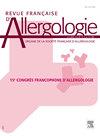依曲单抗诱导的史蒂文斯-约翰逊综合征:文献中的第一例儿科病例报告
IF 0.3
4区 医学
引用次数: 0
摘要
史蒂文斯-约翰逊综合征是一种严重的皮肤粘膜疾病,经常出现在药物反应中,很少观察到。据我们所知,我们报告了第一例由Eculizumab引起的儿童SJS病例,记录了与该治疗相关的儿童潜在风险,并对医学文献做出了重大贡献。一名被诊断为非典型溶血性尿毒症综合征的三岁男性患者接受Eculizumab治疗后,在接受第四次剂量后不久出现了典型的SJS症状。这些症状包括严重的口腔和唇溃疡、结膜充血和广泛的红斑性黄斑疹。最初的实验室检查显示白细胞计数异常和炎症标志物升高,随后的皮肤活检证实SJS。立即开始静脉注射类固醇治疗导致患者的病情有了实质性的改善。该报告强调了早期识别和管理SJS的重要性,特别是在接受单克隆抗体治疗的儿科患者中。关键的经验教训强调,卫生保健提供者需要对这种罕见但可能致命的不良反应保持警惕,并及时停止治疗并进行有效干预,以改善患者的预后。本文章由计算机程序翻译,如有差异,请以英文原文为准。
Eculizumab-Induced Stevens-Johnson Syndrome: The first pediatric case report in the literature
Stevens-Johnson Syndrome is a severe mucocutaneous disease that frequently arises in response to medications and is rarely observed. To our knowledge, we report the first pediatric case of SJS induced by Eculizumab, documenting the potential risks associated with this treatment in children and making a significant contribution to the medical literature. A three-year old male patient diagnosed with atypical hemolytic uremic syndrome and treated with Eculizumab exhibited classical symptoms of SJS shortly after receiving his fourth dose. These symptoms included severe oral and labial ulcers, conjunctival hyperemia, and extensive erythematous macular rashes. Initial laboratory tests revealed an abnormal white blood cell count and elevated inflammatory markers, with a subsequent skin biopsy confirming SJS. Immediate initiation of intravenous steroid therapy resulted in substantial improvement in the patient. This report underscores the critical importance of early recognition and management of SJS, particularly in pediatric patients receiving monoclonal antibody therapy. The key lessons highlight the need for healthcare providers to remain vigilant about this rare but potentially fatal adverse effect, and to promptly discontinue treatment and intervene effectively to improve patient outcomes.
求助全文
通过发布文献求助,成功后即可免费获取论文全文。
去求助
来源期刊

Revue Francaise d Allergologie
Medicine-Immunology and Allergy
自引率
33.30%
发文量
349
期刊介绍:
La Revue Française d''Allergologie : un véritable forum pour faire connaître des travaux originaux et permettre la diffusion de l''information auprès de toutes les spécialités concernées par les pathologies allergiques. La Revue Française d''Allergologie (8 numéros par an) est au carrefour de nombreuses spécialités - dermatologie, pédiatrie, ORL, pneumologie, ophtalmologie, médecine interne - qui, toutes, ont à traiter des maladies allergiques. Les symptômes des allergies fondés sur des mécanismes communs sont le plus souvent associés et se succèdent chez un même patient. En forte progression depuis 20 ans, les maladies allergiques sont dans l''attente de perfectionnements et d''avancées thérapeutiques qui permettront aux nombreux patients qui en sont atteints de mieux vivre avec leurs allergies. La Revue Française d''Allergologie se veut donc un véritable forum de discussions et d''échanges entre tous les spécialistes confrontés aux pathologies
 求助内容:
求助内容: 应助结果提醒方式:
应助结果提醒方式:


